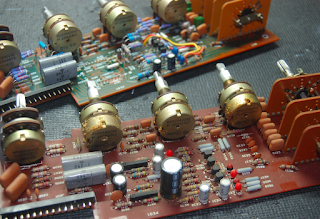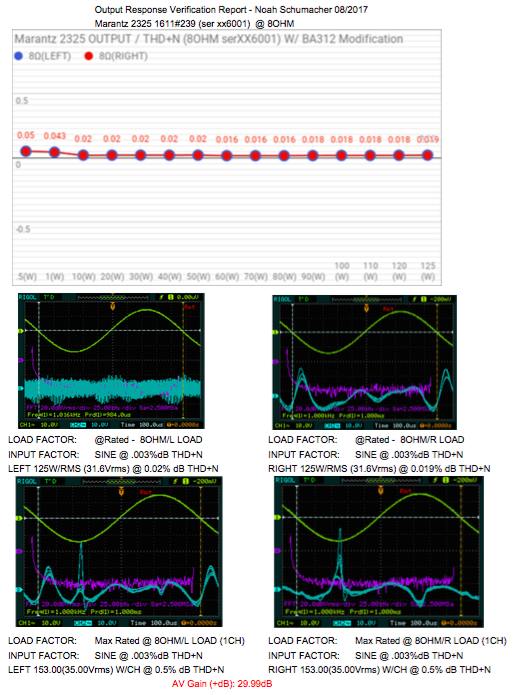Marantz 2325
Today were showcasing two Marantz 2325 Receivers customers brought in for restoration with out exclusive BA312 to OP-Amp modification recently released to the public! The 2325 is a 125 Watt rated receiver, I like to single out the excellent construction on the 2325 compared to a lot of other similarly rated receivers. The 2325 features a healthy amount of RF shielding over each stage, the ever popular P400 phono RIAA EQ stage and now a high performance discrete OP-Amp tone stage.
P800 Power Supply
The 2325 power supply also houses the protection circuit which protects agains over current, dc deviation detection and initially inrush at power up. The P800 is a regulated single end design using two full-wave centre taped rectifiers with a final regulated 35V and 14/19V+ SE rails.
The two initial rectifiers were replaced with state-of-the-art Ultra-Fast, Low Leakage TO-220 common cathode, MUR On-Semi devices with high grade Pansonic ECW polypropylene films capacitors. The initial 220 and 470 smoothing capacitors were increase to 330/1000MFD Nichicon PW low impedance capacitors for decreased ripple potential, along with remaining circuit capacitors to Nichiocn PW’s with an increase in operating voltages. A new precision Bourns adjustment potentiometer installed. All new small signal TO-92L Fairchild devices for better dissipation installed as well as both TO-220 heatsink mounted regulators to a more robust, reliable TIP device with new performance Wakefield thermal compound applied. A new low noise/indicator type Omron MY2 relays were installed.
BEFORE
(someone had soldered in two fuses instead of a relay on this beauty...)
AFTER
Both bridge rectifier filter capacitors were increased from 15,000 to 18,000 computer grade Nippon filter capacitors were installed.
PE01 Tone W/ OP-Amp Adaptive Circuit Upgrade
PH01
Proceeding the the function switch the AF path is converted here to low output impedance sources
(PH01—>Dolby—>PE01)
The PE01 assembly is mirrored in many Marantz models, all of which utilize the monolithic BA312 SIP7 pre-amplifier IC. The BA312 is a obsolete, out-of-production chip used for differential gain stages. We are proud to recently release the first solid, clean Op-Amp adaptive circuit module to replace the original BA312 ICs to a high performance, audiophile grade single end OP-Amp which has been installed on these two 2325’s. We are currently employing the Sparkos Labs SS3601 SE discrete OP-Amp, you can read additional details and performance reports at the link below to our upgrade;
Custom circuit installation is required for our adaptive circuit module which was designed as a SIP7 design (all hardware including pin seats/headers and DIP plated gold) that fits perfectly into the device foot print without the need for changes any traces or cutting any traces! Through changes required in the PE01 circuit some components are omitted. The input coupling films were replaced with high-grade WIMA polypropylene films as well as the 680PF and .1 to high grade WIMA PP films. The FB network and 1st stage coupling as well as the 2nd stage coupling/NFB capacitors all replaced with a audio grade KT and MUSE BiPolar Nichicon capacitors. The DC filtering Ce39 was increased to a 470MFD low impedance PW Nichicon for better results. Remaining small signal devices were replaced with low noise, modern TO-92 Fairchild devices.
BEFORE
AFTER
P400 RIAA EQ & PH01 Buffer
Through testing we see these P400 have an excellent curve response, as well as a massive following for their wonderful sound, why many initially purchase their first Marantz! One flaw to the P400 stages is the implementation of the 2SC458 TO-92 NPN transistor which have a tendency to become noisy, their are often changes to initial coupling stage MFD value from 1-3.3MFD. These tantalums should be a polypropylene 1MFD installed.
For these two models both input/output coupling capacitors were replaced with high grade MKP polypropylene film capacitors. The DC Filter axial capacitors was replaced with a preferred radial type audio grade KT Nichicon and increase to 220MFD for better filtering capacity, KT’s replaced the remaining electrolytic as well with an increase in operating voltages. The VD type epoxy diode was replaced with a series of general Vishay axial diodes and remaining diodes to axial Vishay type. The clipping adjustments were measured and replaced with fixed resistors rather than potentiometers for a more symmetric response. All the NPN devices including the 458 were replaced with low noise, modern TO-92 Fairchild devices. The resulting output is a 40dB gain stage.
BEFORE
AFTER
P700 Drivers
The 2325 uses a differential gain stage and current stage which drives the eventual pre-drivers, the drivers are tied to the dynamic bias circuit.
The differential PNP pairs were matched and thermally coupled together (beta mapping see below Mirrored for X4 Channels.) The 714/715H bias transistors were updated to modern On-Semi TO-126 devices and current stage to modern TO-92L Fairchild devices for better dissipation. These large frame potentiometers tend to hold very well, I recommend a proper cleaning/lubricating as their as good as the Bourns available today.
The electrolytic capacitors and tantalum 33MFD were all replaced with a audio grade KT Nichicon with an increase in operating voltages as well as all films including 1MFD input coupling to high grade MKP polypropylene and WIMA film capacitors. The SB was applied with new axial Vishay diodes.
BEFORE
AFTER
New custom SMD LED indicators and fuse the lamps installed with fresh new Vellum filter paper











































































